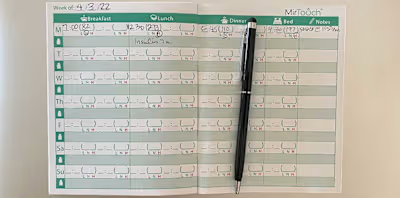Summarizing a Report on Type 2 Diabetes Drugs for Two Audiences
The following is a sample created for personal use, in which the same article was summarized for two audiences. The first is intended for a physician audience, and the second is a short summary for the general public.
Exercise #1: A Physician Audience
Both once-daily liraglutide and once-weekly exenatide offer
effective glycemic control and weight loss when prescribed to those with type 2
diabetes, although the benefits (and also side effects) are greater in those
who receive liraglutide, according to a study published in The Lancet. 1
The class of antihyperglycemic drugs, glucagon-like
peptide-1 (GLP-1) receptor agonists, have shown promise for patients with type
2 diabetes due to their ability to stimulate glucose-dependent insulin
secretion, reduce glucagon secretion, slow gastric emptying, and decrease food
intake.
Prior studies have shown that twice-daily injections of
exenatide––the first approved GLP-1 receptor agonist––decreased fasting and
post-prandial glucose concentrations, reduced body weight, and improved
glycemic control. 2-5 Since then, exenatide has been developed into
a once-weekly formulation and approved for use in patients with type 2
diabetes. An alternative GLP-1 receptor agonist for those with type 2 diabetes
is liraglutide, which comes in a once-daily format.
Research has shown that liraglutide and once-weekly
exenatide produce better glycemic control than twice-daily exenatide,6
but Buse et al. completed the first comparative study between once-daily
liraglutide and once-weekly exenatide.
For the study, the researchers conducted a 26-week,
open-label, randomized study at 105 sites spanning 19 countries. Patients
eligible for the study had type 2 diabetes, were at least 18 years old, and had
inadequate glycemic control despite diet and exercise lifestyle changes and
oral antihyperglycemic drugs at maximum or near-maximum doses. After a
week-long screening period, the patients were randomly assigned to receive
daily injections of liraglutide or once-weekly exenatide.
All patients saw a similar decline in blood pressure
alongside improvements in the cardiovascular biomarker brain natriuretic
peptide. Both drugs also showed a decrease in HbA1c compared to
baseline recordings, although the change in HbA1c from endpoint to
baseline was greater in the patients taking liraglutide compared to those
taking exenatide. Furthermore, while both treatments were associated with a
loss of body weight and a decrease in fasting serum glucose, these declines
were also greater in the patients taking liraglutide.
Surprisingly, these findings do not match the researcher’s
initial predictions, with them expecting exenatide to have a greater effect on
glycemic control and weight loss than liraglutide because of studies that
compared these treatments with other oral antidiabetic drugs. Some possible
reasons for this study’s unexpected findings include the study population,
pharmacological exposure, or study design, although the true reason remains
unknown.
As for adverse events, the most common for both groups were
gastrointestinal, with the liraglutide group seeing a greater frequency of
diarrhea, nausea, and vomiting. For both groups, the frequency of these events
was greater at the beginning of the treatment and then decreased in incidence
over time. However, 24 (5%) of the patients in the liraglutide group
discontinued treatment due to these adverse events, whereas only 12 (3%)
patients from the exenatide group opted to stop treatment.
While the liraglutide group experienced more mild
gastrointestinal adverse events, the researchers noted more serious adverse
events in the exenatide group, although there was no distinguishable pattern to
the events.
Of note, a limitation of the study is its open-label design,
which was chosen because of the unavailability of once-daily liraglutide as a
placebo. However, the open-label design may have influenced patients’
expectations. Furthermore, the lack of systematically obtained pharmacokinetic
data limits the ability of the research team to assess the reasoning behind
their findings.
Despite these limitations, this study serves as the first
direct comparison between the efficacy and safety of two GLP-1 receptor
agonists used to treat type 2 diabetes. The findings by Buse et al. show that
both treatments improved glycemic control and promoted weight loss, although
these results were greater in those receiving liraglutide compared to
exenatide. These benefits also come at a cost, with the liraglutide group
seeing increased gastrointestinal side effects.
Overall, the information gained from this study regarding
the efficacy and safety comparisons of liraglutide and exenatide can further
improve clinical decision-making for patients with uncontrolled type 2 diabetes,
especially those unresponsive to antihyperglycemic drugs.
References
1. Buse JB, Nauck M, Forst T, et al. Exenatide once weekly versus liraglutide once daily in patients with type 2 diabetes (DURATION-6): a randomised, open-label study. Lancet. 2013;381(9861):117-124. doi:10.1016/S0140-6736(12)61267-7
2. Buse JB, Henry RR, Han J, et al. Effects of exenatide (exendin-4) on glycemic control over 30 weeks in sulfonylurea-treated patients with type 2 diabetes. Diabetes Care. 2004;27(11):2628-2635. doi:10.2337/diacare.27.11.2628
3. DeFronzo RA, Ratner RE, Han J, Kim DD, Fineman MS, Baron AD. Effects of exenatide
(exendin-4) on glycemic control and weight over 30 weeks in metformin-treated patients with type 2 diabetes. Diabetes Care. 2005;28(5):1092-1100. doi:10.2337/diacare.28.5.1092
4. Kendall DM, Riddle MC, Rosenstock J, et al. Effects of exenatide (exendin-4) on glycemic control over 30 weeks in patients with type 2 diabetes treated with metformin and a sulfonylurea. Diabetes Care. 2005;28(5):1083-1091. doi:10.2337/diacare.28.5.1083
5. Klonoff DC, Buse JB, Nielsen LL, et al. Exenatide effects on diabetes, obesity, cardiovascular risk factors and hepatic biomarkers in patients with type 2 diabetes treated for at least 3 years. Curr Med Res Opin. 2008;24(1):275-286. doi:10.1185/030079908x253870
6. Drucker DJ, Buse JB, Taylor K, et al. Exenatide once weekly versus twice daily for the treatment of type 2 diabetes: a randomised, open-label, non-inferiority study. Lancet. 2008;372(9645):1240-1250. doi:10.1016/S0140-6736(08)61206-4
Exercise #2: The General Public
Researchers have placed liraglutide and exenatide––two
treatments intended for those with type 2 diabetes––head-to-head regarding
their safety and effectiveness. 1
For the study, eligible patients had to be above 18 years of
age with type 2 diabetes. Additionally, the participants needed to have poor blood
sugar control despite making lifestyle changes and taking appropriate medication.
Once the researchers screened the eligible patients, they were divided into two
groups: one receiving once-daily liraglutide and the other receiving
once-weekly exenatide.
Based on previous studies comparing each treatment with
other antidiabetic drugs, the researchers expected exenatide to have greater
results, but their findings were surprising.
When it came to the drug’s ability to control blood sugar
levels and promote weight loss, both drugs were effective, but liraglutide saw
greater results. However, this came at the expense of greater gastrointestinal
side effects such as nausea, diarrhea, and vomiting. In most cases, these side
effects were mild in both treatment groups, but 5% of the liraglutide group and
3% of the exenatide group decided to opt out of the study because of them.
The results of this head-to-head comparison show that both
liraglutide and exenatide can help improve blood sugar levels in those with
type 2 diabetes, but liraglutide can be a bit more effective than exenatide.
Still, the results of this study can help doctors make better clinical decisions
when treating someone with type 2 diabetes whose other medications are not
working.
References
1. Buse JB, Nauck M, Forst T, et al. Exenatide once weekly versus liraglutide once daily in patients with type 2 diabetes (DURATION-6): a randomised, open-label study. Lancet.
2013;381(9861):117-124. doi:10.1016/S0140-6736(12)61267-7
Like this project
Posted Jan 12, 2024
The following is a sample created for personal use, in which the same research article was summarized for two audiences.
Likes
1
Views
65







